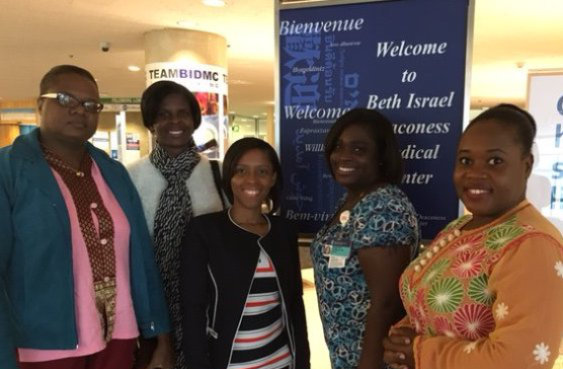For more than a decade Regis has worked alongside local partners around nursing in Haiti and in 2019, the university was awarded a large grant from the Wagner Foundation to further its critical work. The Regis In Haiti project is focused on advancing the nursing profession by training nurse educators, strengthening clinical skills among student and novice nurses, and fostering evidence-based research to bolster the country’s healthcare system. The Wagner Foundation’s support will galvanize the next phase of Regis’ joint work with partners including Health Equity International, St. Boniface Hospital, Partners In Health, Zanmi Lasante, public nursing schools, and the Haitian Ministry of Health.
History and Need
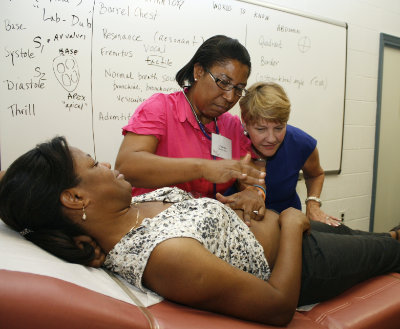 Due to longstanding international interference, natural disasters, and political instability Haiti is the most impoverished nation in the Western Hemisphere and the nation with the highest rates of maternal, infant, and children-under-five mortality. In addition, the country has an acute shortage of nursing clinicians and nurse educators, however, nurses provide over 90% of healthcare in the world, with higher percentages noted in lower resource communities. The Regis In Haiti Project aims to increase access to quality care and improve patient outcomes through the advancement of nursing education, leadership, and opportunity.
Due to longstanding international interference, natural disasters, and political instability Haiti is the most impoverished nation in the Western Hemisphere and the nation with the highest rates of maternal, infant, and children-under-five mortality. In addition, the country has an acute shortage of nursing clinicians and nurse educators, however, nurses provide over 90% of healthcare in the world, with higher percentages noted in lower resource communities. The Regis In Haiti Project aims to increase access to quality care and improve patient outcomes through the advancement of nursing education, leadership, and opportunity.
Regis in Haiti, formerly known as the Regis Haiti Project, started in 2007 with a collaboration between college nursing faculty, the Haitian Ministry of Health, and Partners in Health/Zanmi Lasante to teach and train nurse faculty and leaders so that they can better prepare the next generation of providers, all to improve patient care.
Regis team members traveled to Haiti to identify areas of need in nursing education programs, the implications of those educational gaps in the field, and to discover innovative ways Regis could collaborate to strengthen and support the nursing profession. At the time, no Haitian government-sponsored graduate-level nursing program existed and the Ministry of Health was working with the public nursing schools to implement a four-year baccalaureate curriculum. This initiative was consistent with the World Health Organization’s recommendations and research confirming that nurses trained at the baccalaureate-degree level or higher have significantly better patient care outcomes. However, the institutions lacked the nursing faculty to teach at this advanced level. The Ministry of Health leadership, nursing schools deans, and Regis faculty agreed that an ‘educate the educator’ model designed to further nurse faculty’s level of training was imperative to address this void, improve nursing clinical skills and access to quality nursing care, and ultimately enhance the health and well-being of Haitians.
As a result, and with the support of grant awards from the Clinton-Bush Haiti Fund and the W.K. Kellogg Foundation, a total of 37 core nursing faculty and clinical practitioners working in both Haitian public and private nursing schools graduated with a Master’s of Science Degree. Additionally, each Master’s-prepared nurse faculty has built local capacity to strengthen the newly instituted four-year baccalaureate-degree programs that now exist in all regions of the country.
Our Current Work
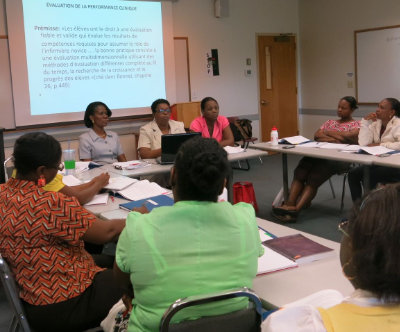 This next phase of the Regis In Haiti work aims to advance the following objectives:
This next phase of the Regis In Haiti work aims to advance the following objectives:
- Conduct a robust evaluation of the four-year baccalaureate programs to measure quality of curriculum implementation, student achievement and outcomes, and identify strengths and areas for growth in the programs
- Host a two-week course for Haitian clinical nursing faculty at Regis based on the latest pedagogy related to clinical skills training and preparation
- Outfit and equip simulation training laboratories at universities in the most needed areas of Haiti
- Train simulation laboratory directors who will run future laboratories at all public nursing schools, Mirebalais Hospital and St. Boniface Hospital - during the past decade, training nurses in simulation labs has become the gold standard in nursing (and medical) education in the United States. Faculty and students are able to recreate patient-care experiences in safe, learning laboratories with critical debriefing time following activities.
- Collaborate with teaching hospitals in Haiti to support nurse educators who will train monitrices, or preceptors, an experienced nurse who mentors and helps train novice nurses in clinical settings to bridge the gap between theory (college curriculum) and practice. This piece will continue the work of the former Nursing Clinical Excellence Program.
- Induct our Haitian colleagues into Sigma Theta Tau International, the global nursing honor society that promotes nursing scholarship and excellence in nursing practice. The Regis In Haiti team will work with Regis’s chapter to support opportunities for nurses to do research and help inform best practices for patient care because when nurses are given the opportunity for research, publication, and presentation, the profession becomes academically more prestigious, respected, and financially rewarding.
- Continue to build human infrastructure in Haiti by “educating the educators” in nursing who can, in turn, educate the next generations of Haitian nurses
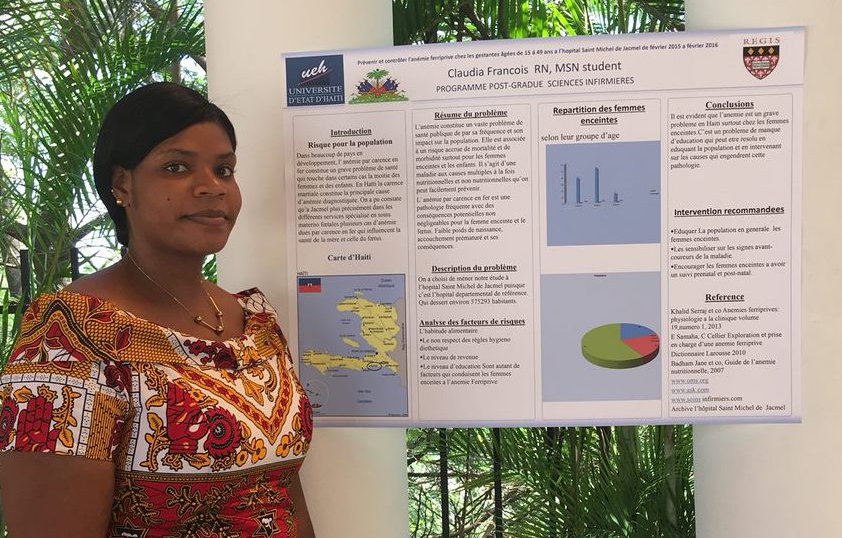
Past Projects and Partnerships
-
The Regis College Haiti Project
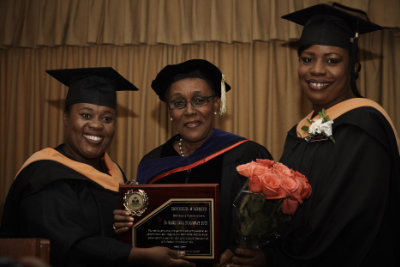 The Regis College Haiti Project exists to improve patient care and health outcomes in Haiti by providing a highly targeted, international development initiative centered on improved nursing education, leadership and credentialing. The project contributes to an expansive trajectory harnessing the impact of higher education for nurses in Haiti, leading to the institutionalization of baccalaureate and master's level nursing education and, in turn, to improved patient care into the future.
The Regis College Haiti Project exists to improve patient care and health outcomes in Haiti by providing a highly targeted, international development initiative centered on improved nursing education, leadership and credentialing. The project contributes to an expansive trajectory harnessing the impact of higher education for nurses in Haiti, leading to the institutionalization of baccalaureate and master's level nursing education and, in turn, to improved patient care into the future.Supported by grant awards from the Clinton-Bush Haiti Fund, the W.K. Kellogg Foundation and private donors, the Regis Haiti Project has now graduated 37 nursing faculty with a master’s degree in nursing with a focus on leadership.
Today, the project continues to work with partners and alumni to establish an alumni association focused on further advancing the nursing profession in Haiti with on-the-ground partnerships and graduates from the program.
-
Be Like Brit (BLB) Clinic Partnership
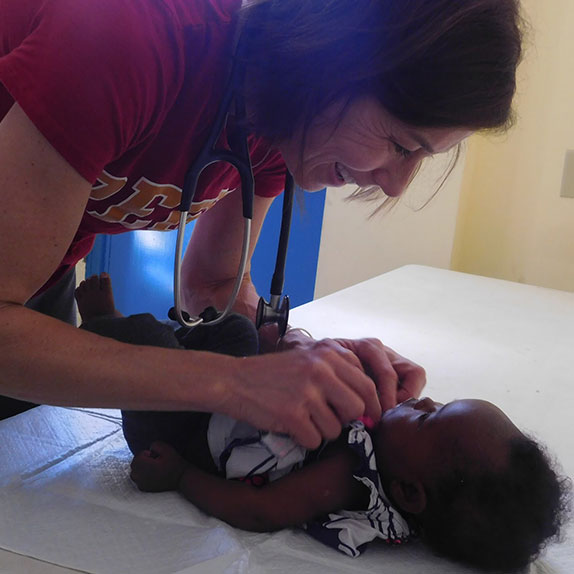 The Be Like Brit Foundation and Orphanage and Regis College worked collaboratively until 2020 to meet the healthcare needs of villagers living in Grand Goâve, the location of BLB. This partnership provided care to men, women, and children who would otherwise be without access to quality care. Visiting faculty from Regis also hosted lunches for local community members where health information that villagers previously requested was shared.
The Be Like Brit Foundation and Orphanage and Regis College worked collaboratively until 2020 to meet the healthcare needs of villagers living in Grand Goâve, the location of BLB. This partnership provided care to men, women, and children who would otherwise be without access to quality care. Visiting faculty from Regis also hosted lunches for local community members where health information that villagers previously requested was shared. -
Nursing Clinical Excellence Program
Regis is proud to be working with the incredible Partners In Health hospital in Mirebalais, Haiti (HUM). To continue to advance and support the healthcare system in Haiti, Regis has begun working to develop a Clinical Excellence Program with nurse educators at the hospital in Haiti. Through Regis’ work with the Haiti project, it became clear that a large gap exists between curriculum at the various schools of nursing and clinical practice in the hospitals and healthcare facilities. This project was created to begin to bridge that gap and improve and strengthen clinical education and care in Haiti.
